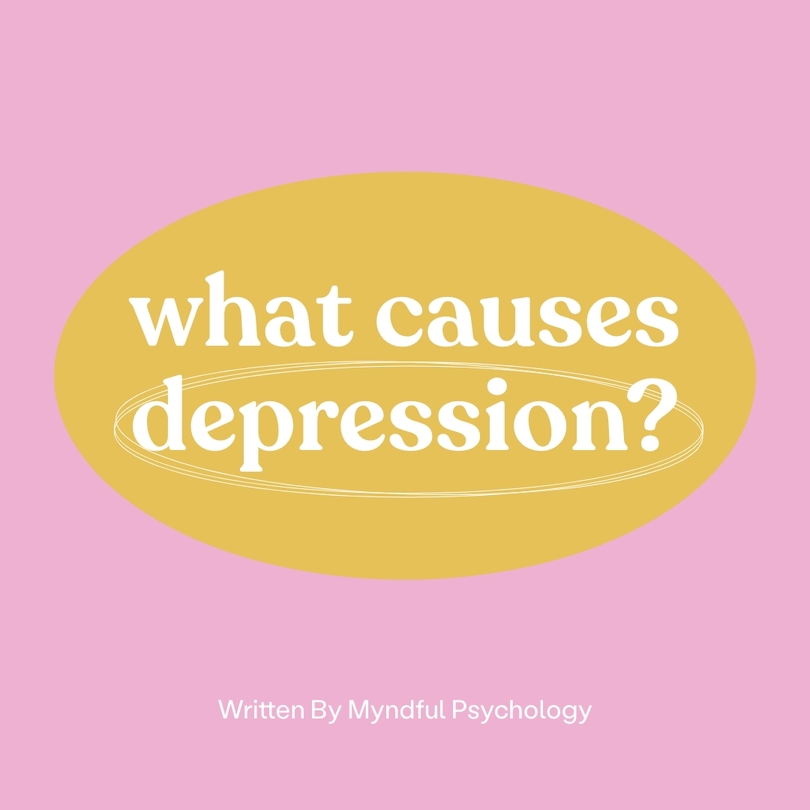What causes depression
There is no single cause for depression. A number of factors in your life may be causing depression, these can be complex to unravel.

Dr Aneta Kotevski
March 8, 2023
4 min read
#depression-and-anxiety

When a person has depression or is at risk of developing depression, there are usually several factors influencing their state of mind, resulting in chronic low mood and poor well-being.
Biology
Depression runs in families. If a member of your family experiences depression or has experienced depression in their lifetime, this may indicate you are more susceptible to depression. We know that genes can indicate a person is more likely to suffer depression at some point in their lifetime.
However, it it’s good to know that this is not a life sentence. There is no single gene that predicts whether someone will suffer depression. You may never have depression, even if there are family members who have had depression.
Environment
The environment we live in, and our daily lifestyle, workload, stress etc. can lead to depression. These factors may be combined with difficult or traumatic life experiences, which can increase the risk of depression.
Significant stressors such as difficulties in home and family life, stress in the workplace, abusive relationships, long-term isolation and loneliness can all increase the risk of depression.
Environments that trigger burnout e.g., prolonged work hours, high workloads, natural disasters, reduced self-care, lack of exercise and disturbed sleep, increases the probability of depression.
Thinking
The way you think about yourself has a huge influence on whether you will develop depression. People diagnosed with depression are more prone to self-criticism and perfectionism than others.
Negative core beliefs about yourself e.g., “I’m not good enough”, “I’m unlovable”, “I always make mistakes” can cause depression.
Catastrophising that the worst will happen, especially in the absence of any reason to think bad things will happen, can negatively influence your mood and motivation. e.g. “I don’t want to go to this meeting at work today, there is going to be conflict”.
Catastrophising after an event, and ruminating on it in an overly-negative way, can be a contributing factor. For example, you may have an overly-negative perception of a social interaction. e.g. "I shouldn't have said that in front of my friends, I really embarassed myself".
Often this catastrophising is combined with constant rumination on these thoughts. This sort of half glass empty thinking and rumination, over time, can be exhausting and can make you significantly depressed.
Relationships
Relationships and interactions with the people in your life can impact your thinking about yourself. Difficulties, conflict and traumatic events can have a huge influence on whether you will develop depression.
Your perception of yourself can be heavily influenced by negative dynamics or incidents in relationships with friends and family. Incidents with people we encounter during our daily life can also unreasonably influence our perception of ourselves.
Trauma and loss
Early childhood trauma, abuse, or assault can cause depression. Trauma, abuse, or assault as an adult can also cause depression. Depression can surface many months or years after a traumatic event.
Recovery from a traumatic event such as the loss of a loved one, a serious accident or physical injury, experiencing a natural disaster, can be difficult to navigate and can lead to depression.
Medical conditions
You may be going through the stress and worry of coping with a chronic medical condition such as chronic pain, cancer, diabetes, or heart disease or similarly complicated health condition.
When there is physical injury or a medical condition, there may be also medication involved, which can sometimes contribute to depression.
You may be suffering from a neurodegenerative disorder such as motor neurone disease, Alzheimer’s disease, or Parkinson’s disease.
All these conditions are difficult to cope with and can put you at risk of depression.
Coping style
Personal factors and the way a person copes with emotional and mental issues can be contributing factors to depression. In some circumstances this can include significant drug and alcohol use which, while often used as a way to cope, can be significant contributors to depression.
Anxiety
Anxiety is often closely related to depression. The causes of anxiety, and the symptoms of anxiety, can lead to depression.
Read our series on anxiety to learn more.
How Myndful can help
Our experienced psychologists can help you to unravel the many contributing factors and get to the root of why you are suffering from depression. We can provide psychological assessments and evidence-based treatments to help you recover and have an improved quality and enjoyment in life.
Up next
In the next part of this series on depression, we will explore the different types of mood disorders you may be suffering from. Later in the series we will talk about treatments for depression we offer at Myndful. Stay tuned…!
Aneta is a registered and endorsed clinical and health psychologist and AHPRA board approved supervisor in clinical and health psychology. She is also a member of the EMDR Association of Australia.